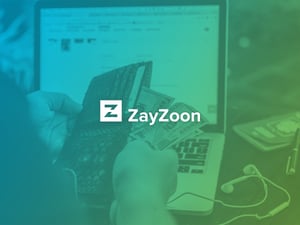
What is Income Volatility and Why is it Bad?
 Tate Hackert
Tate Hackert
Tate is the brain behind ZayZoon, developing the idea of providing access to funds before payday, in 2013. He feels gratified knowing “we get to improve the financial health of people each and every day.” One of his favourite ZayZoon experiences involves a business trip to Selinsgrove, Pennsylvania where he helped film a Holiday Inn Express testimonial video. Wearing a ZayZoon shirt at the local Walmart, someone saw Tate and exclaimed, “Hey, ZayZoon! I use that!"
Does the income of your workers fluctuate? Income volatility is defined as a 25% change in annual income from one year to the next. Income volatility in today’s workforce, especially the gig economy and on-demand workforce though can be more defined by income fluctuations on a week to week, or even day to day basis. This phenomenon is quite a bit more common than many people think.
However, even if a person’s income doesn’t fluctuate quite that much, having an unstable income source that spikes at random times mean that employees do not have consistent access to necessary funds. That leaves them vulnerable to fees and debt, and it also greatly diminishes their financial wellbeing.
The Facts About Income Volatility
In one survey completed by the Pew Research Center, they found that 34% of American households–more than a third–were subject to income that fluctuates by more than 25% year over year.
Income volatility exists in every demographic group, but it is particularly common for a few select populations. At least 1 in 4 households across every education/income level and across every race will experience substantial income shifts. That’s 25% of all households that will see a tremendous change in their anticipated income, whether it’s a positive change or a negative one.
For 20% of Hispanic households and homes that lack a high school diploma, the shift is expected to be negative. For 38% of homes with incomes below $25,000 annually, the shift is expected to be positive.
These are interesting statistics that demonstrate that income volatility is a prevailing issue, even if it isn’t discussed often.
Why Fluctuating Income Is A Disadvantage
Income volatility affects both the rich and the poor, with the biggest cause often attributed to the gig economy. The thing about fluctuating income is that it makes it difficult to follow conventional financial advice.
If a person does not have a steady and regular paycheck, they can’t be consistently putting X into savings, X into retirement, or X towards their debt. They have to constantly be planning, re-planning, and make adjustments just to make ends meet.
Bills tend to be fixed amounts charged on a monthly schedule, but fluctuating income can make it difficult for a person to correctly budget their bills every month, much less plan enough to put extra away into savings.
Handling Volatile Income
- Employees need to carefully plan ahead and try to anticipate when their income will be high, when it will be low, and for how long those “low” periods will last.
- Employees need to only spend the bare minimum on bills. Put any leftover income into a savings account to cover bills during the months when their income does not allow them to.
- Employees need to attempt to save money when they have extra available to them and find ways to continue to contribute to a retirement fund even if it’s not a regular deposit from their irregular paycheck.
Steady Income Can Boost Financial Wellness
Financial wellness is a popular topic today. From articles covering everything from income to savings, it’s easy for employees to get lost in a sea of information and, oftentimes, misinformation, about what they should be doing with their money.
ZayZoon is a financial technology (FinTech) company that empowers the working class by opening the door to employee advances or more specifically on-demand pay. With ZayZoon, workers can access the money they have earned as soon as they have earned it. That means no more two-week wait for a paycheck. More importantly, it means no additional debt needed to be burdened by employees either. People now have the opportunity to fight income volatility without needing a loan, credit card or overdraft.
Life events don’t happen on a set schedule, and we don’t think employees can thrive when they have to fit their lives around their pay period. Doing so can lead to delayed payments, overdraft fees, and massive inconvenience. Help us make a difference by extending the ZayZoon financial wellness platform to your employees today.
To learn about how ZayZoon can help, click here.
References





